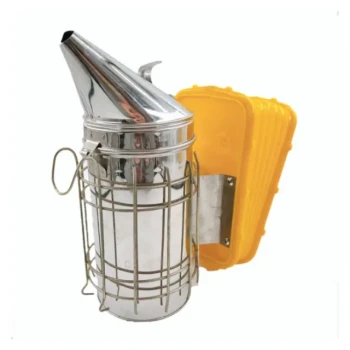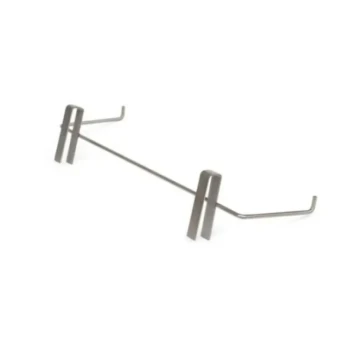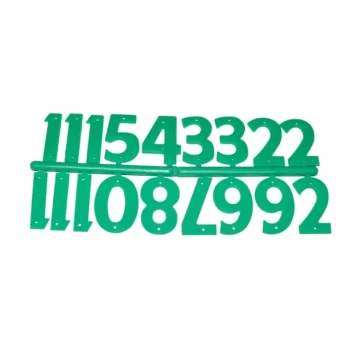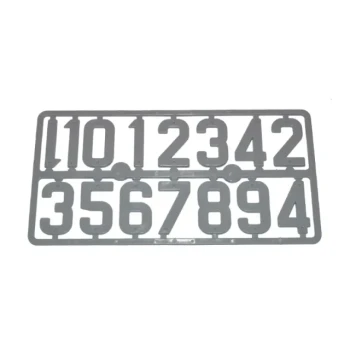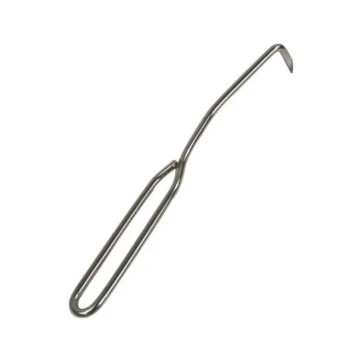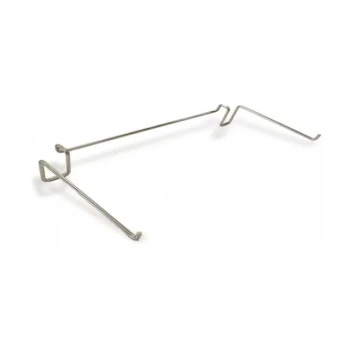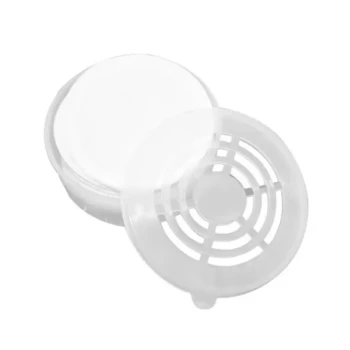At its core, regularly laundering your beekeeping clothing and gloves is essential for safety, hive health, and equipment usability. Clean gear helps eliminate sting and hive odors that can agitate bees, while also preventing the spread of harmful pathogens. This simple act of hygiene directly impacts your safety, the health of your colonies, and the longevity of your gear.
Cleaning your beekeeping suit and gloves is not a matter of simple tidiness. It is a fundamental practice of good apiary management that directly influences bee behavior and mitigates the risk of spreading harmful pathogens between your hives.
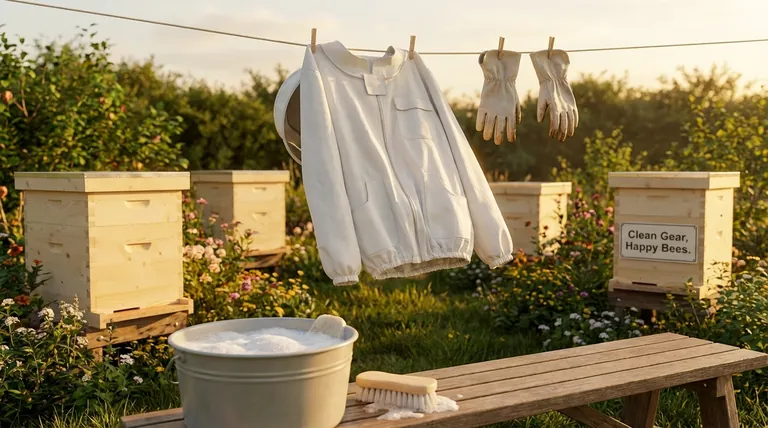
The Core Reasons for Regular Cleaning
Understanding why this task is so important reinforces it as a non-negotiable part of your beekeeping routine. The benefits extend far beyond simple aesthetics.
To Reduce Bee Aggression
When a bee stings, it releases an alarm pheromone that smells like bananas. This odor signals a threat to other bees, marking you as a target and increasing their defensive behavior.
Regularly washing your suit and gloves helps to remove these residual pheromones, making you less likely to be perceived as a threat on subsequent hive inspections. It also washes away hive odors that can attract unwanted attention from bees.
To Prevent Disease Transmission
Your gloves and suit can easily pick up bacteria, fungal spores, and viruses from one hive. Moving to another hive without cleaning your gear creates a direct vector for disease.
This is especially critical if you manage multiple apiaries or are helping another beekeeper. Proper hygiene is a cornerstone of biosecurity, helping to prevent the spread of devastating diseases like American Foulbrood.
To Improve Handling and Usability
Gloves caked with dried honey, wax, and propolis become stiff and sticky. This makes delicate tasks like handling frames, finding the queen, or performing inspections clumsy and frustrating.
Clean, supple gloves allow for better dexterity and a more sensitive touch, improving your effectiveness and reducing the chance of accidentally crushing bees or dropping equipment.
To Extend the Life of Your Gear
Beekeeping suits and, in particular, quality leather gloves are an investment. Propolis and beeswax can degrade fabrics and leather over time.
Regular, proper cleaning removes these corrosive substances and helps maintain the material's integrity, ensuring your protective gear lasts for many seasons.
How to Properly Clean Leather Beekeeping Gloves
While a beekeeping suit can often be machine washed (after removing any inserts), leather gloves require a specific, manual approach to avoid damage.
Step 1: Prepare Your Cleaning Solution
Fill a bucket with warm water and a small amount of mild laundry detergent. Avoid harsh chemicals or bleach, which will damage the leather.
Step 2: Gently Scrub the Gloves
Dip a soft-bristled brush or cloth into the soapy water. Gently scrub the surface of the gloves to remove honey, propolis, and dirt. Pay attention to the gauntlets (sleeve portions) as well.
Step 3: Rinse and Air Dry
Rinse the gloves thoroughly under cold, clean water to remove all soap residue. Squeeze out excess water gently without wringing or twisting the leather.
Hang the gloves to dry in a shady, well-ventilated area. Never place them in a machine dryer or in direct sunlight, as intense heat will make the leather brittle and cracked.
Step 4: Condition the Leather
Once the gloves are completely dry, apply a leather conditioner. This crucial final step restores the oils in the leather, keeping the gloves soft, supple, and water-resistant.
Common Pitfalls to Avoid
How you clean your gear is as important as the act itself. Common mistakes can ruin expensive equipment.
The Mistake of Machine Washing Leather
Never wash leather gloves in a washing machine. The intense agitation, prolonged soaking, and high-spin cycles will permanently damage, shrink, and stiffen the leather.
The Danger of Soaking
Avoid soaking leather gloves for an extended period. This can cause the leather to become waterlogged and lose its natural oils, leading to cracking once it dries. A quick, gentle scrub is far more effective and safer for the material.
Using Harsh Chemicals or Stains Removers
For tough stains like propolis, you might be tempted to use a strong solvent. Always test a mild alternative, like white vinegar or a baking soda paste, on a small, inconspicuous area first. Aggressive chemicals can discolor or weaken the leather.
Making the Right Choice for Your Goal
Your cleaning routine should align with your primary objectives as a beekeeper.
- If your primary focus is safety and calm hives: Prioritize washing your suit and gloves after any inspection where you received stings to remove alarm pheromones.
- If your primary focus is hive health and biosecurity: Make it a strict rule to clean your gear, especially gloves and hive tools, before moving between different bee yards.
- If your primary focus is equipment longevity: Commit to the full manual cleaning and conditioning process for your leather gloves to protect your investment.
By integrating this routine into your beekeeping practice, you elevate your role from a keeper to a responsible steward of your colony's health and well-being.
Summary Table:
| Reason for Cleaning | Key Benefit | Impact |
|---|---|---|
| Remove Alarm Pheromones | Reduces Bee Aggression | Safer hive inspections |
| Eliminate Pathogens | Prevents Disease Spread | Protects colony health |
| Clean Off Propolis/Wax | Improves Dexterity & Handling | More efficient work |
| Maintain Material Integrity | Extends Gear Lifespan | Protects your investment |
Protect your investment and your colonies with the right gear and knowledge. HONESTBEE supplies commercial apiaries and beekeeping equipment distributors with durable, high-quality beekeeping supplies and equipment designed for easy maintenance and long-term use. Let our wholesale-focused expertise help you build a safer, more productive operation. Contact our team today to discuss your needs and browse our catalog.
Visual Guide
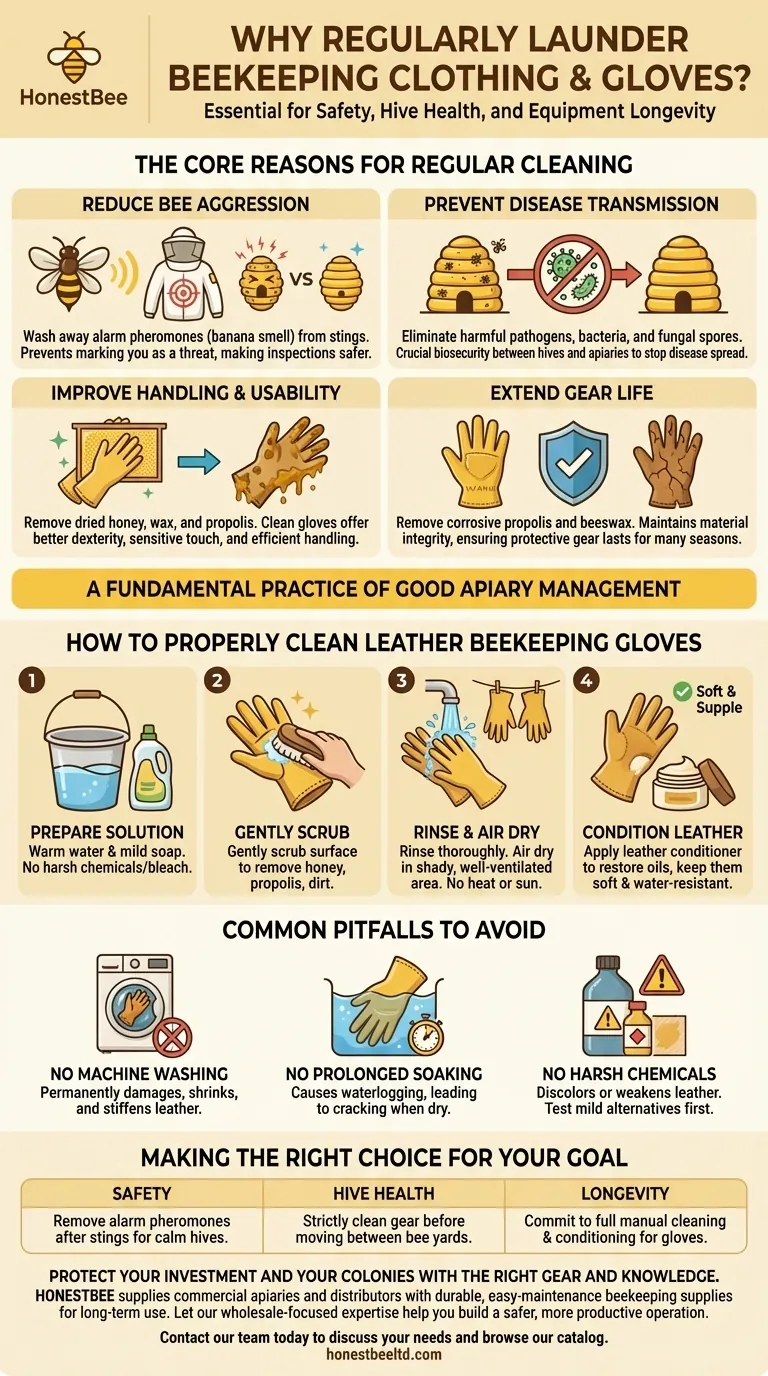
Related Products
- Wholesales Dadant Size Wooden Bee Hives for Beekeeping
- Yellow Plastic Bucket Pail Perch for Beekeeping
- Long Langstroth Style Horizontal Top Bar Hive for Wholesale
- Automatic Honey Flow Beehive 4 Frame Mini Hive for Beekeeping
- Professional Bee Smoker with Elongated Spout and Durable Bellows for Beekeeping
People Also Ask
- What are the pros and cons of full vs. partial beekeeping suits? Choose the right protection for your apiary.
- What protections do beekeeping suits and veils provide? Maximize Efficiency and Safety in Commercial Apiaries
- What physical safeguards do specialized beekeeping protective clothing and maintenance tools provide? Secure Your Colony
- How can the durability of a beekeeping suit be assessed? Expert Guide to Long-Lasting Protection
- Why is wearing a bee suit necessary for beekeeping? Stay Safe and Build Confidence in Your Apiary
- Why do beekeepers often wear white clothing? The Science Behind Bee Calm and Keeper Safety
- What are the functions of professional beekeeping protective clothing and disinfection equipment in preventing disease?
- What is the importance of high-grade beekeeping protective equipment in api-tourism safety? Ensure Secure Experiences




